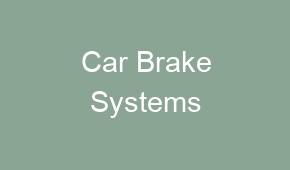Car Brake Systems

Car brake systems are critical for safe driving. They use hydraulic pressure to apply friction to the rotors or drums, slowing down or stopping the vehicle. Regular maintenance and inspection are essential to ensure optimal performance and prevent accidents.
Car brake systems play a crucial role in ensuring the safety and control of vehicles. Brake pads, brake rotors, and brake calipers are vital components that work together to facilitate the braking process. These components undergo significant wear and tear over time, necessitating regular maintenance and replacement. Proper brake fluid levels and quality are crucial for optimal braking performance. Anti-lock braking systems (ABS) are designed to prevent wheel lock-up and maintain steering control during emergency braking situations. It is essential to have a skilled brake technician inspect and service the brake system regularly to prevent accidents and ensure efficient braking. Neglecting brake maintenance can lead to brake failure and jeopardize the safety of both the driver and passengers.
| Car Brake Systems: Essential for safe stopping and slowing down vehicles. |
| Components: Brake pads, rotors, calipers, brake lines, and master cylinder. |
| Types: Disc brakes (common), drum brakes (older models). |
| Function: Converts kinetic energy into heat to stop or slow down the vehicle. |
| Brake Fluid: Required for proper operation, needs to be changed periodically. |
- Anti-lock Braking System (ABS): Prevents wheels from locking up during hard braking.
- Brake Fade: Reduction in braking power due to excessive heat build-up.
- Brake Pad Wear: Regular inspection and replacement needed to ensure optimal braking.
- Brake Rotors: Discs that spin with the wheel and provide friction for stopping.
- Brake Calipers: Contains the brake pads and applies pressure to the rotors.
What are the different types of car brake systems?
There are two main types of car brake systems: drum brakes and disc brakes. Drum brakes consist of a brake drum, brake shoes, and a wheel cylinder. They are commonly used in the rear wheels of older vehicles. On the other hand, disc brakes use a rotor, brake pads, and calipers to slow down or stop the vehicle. They are more commonly found in the front wheels of modern cars.
How do drum brakes work?
Drum brakes work by using a hydraulic system to push brake shoes against the inside of a rotating brake drum. When the brake pedal is pressed, the hydraulic fluid activates the wheel cylinder, causing the brake shoes to expand and press against the drum. Friction is created, slowing down or stopping the vehicle.
How do disc brakes work?
Disc brakes work by using a hydraulic system to squeeze brake pads against a rotating brake rotor. When the brake pedal is pressed, the hydraulic fluid activates the calipers, which push the brake pads onto the rotor. The friction between the pads and the rotor slows down or stops the vehicle.
What are the advantages of disc brakes over drum brakes?
Disc brakes offer several advantages over drum brakes. They provide better stopping power, as the brake pads make direct contact with the rotor. Disc brakes also dissipate heat more efficiently, reducing the risk of brake fade. Additionally, they are generally easier to service and maintain compared to drum brakes.
What are the signs of brake system problems?
Common signs of brake system problems include squeaking or grinding noises, a spongy brake pedal, vibrations while braking, and a longer stopping distance. If you experience any of these symptoms, it is important to have your brake system inspected and repaired by a professional.
How often should brake pads be replaced?
Brake pads should typically be replaced every 20,000 to 70,000 miles, depending on driving habits and the type of brake pads used. It is important to have them inspected regularly and replaced when they are worn down to ensure optimal braking performance and safety.
Can I replace brake pads myself?
While it is possible to replace brake pads yourself, it is recommended to have them replaced by a professional. Proper installation is crucial for the brake system’s performance and safety. If you are not experienced or confident in your abilities, it is best to leave it to a qualified mechanic.
How long does it take to replace brake pads?
The time it takes to replace brake pads can vary depending on the vehicle and the mechanic’s expertise. On average, it can take around 1 to 2 hours. However, this can be longer if additional brake components need to be replaced or if there are complications during the process.
What is brake fluid and why is it important?
Brake fluid is a hydraulic fluid that transfers force from the brake pedal to the brake components. It plays a crucial role in the brake system’s operation by allowing the hydraulic system to function effectively. Regularly checking and maintaining the brake fluid level is important for safe braking performance.
How often should brake fluid be changed?
Brake fluid should typically be changed every 2 to 3 years or as recommended by the vehicle manufacturer. Over time, brake fluid can become contaminated and lose its effectiveness, compromising the brake system’s performance. Regularly changing the brake fluid helps ensure optimal braking performance and safety.
What is ABS and how does it work?
ABS stands for Anti-lock Braking System. It is a safety feature that prevents the wheels from locking up during hard braking, allowing the driver to maintain steering control. ABS works by rapidly modulating the brake pressure on each wheel, reducing the likelihood of skidding or loss of control.
What is the purpose of a brake booster?
A brake booster, also known as a power brake booster, assists in the braking process by multiplying the force applied to the brake pedal. It uses vacuum pressure from the engine to make braking easier and more efficient. The brake booster enhances braking performance and reduces the effort required by the driver.
Why does my brake pedal feel soft?
A soft brake pedal can be indicative of air or moisture in the brake system, a leak in the brake lines, or worn brake components. It is important to have the brake system inspected and repaired promptly to ensure proper braking performance and safety.
Why does my brake pedal vibrate?
A vibrating brake pedal can be caused by warped brake rotors, unevenly worn brake pads, or suspension issues. These conditions can result in an uneven contact between the brake pads and rotors, leading to vibrations when braking. It is recommended to have the brake system and suspension inspected by a professional.
What is brake fade?
Brake fade refers to the loss of braking power due to overheating of the brake components. This can occur during prolonged or intense braking, such as when descending steep hills or when driving aggressively. Brake fade can result in a significant decrease in braking performance, making it crucial to allow the brakes to cool down and regain their effectiveness.
How can I extend the life of my brake system?
To extend the life of your brake system, it is important to practice good driving habits, such as avoiding harsh braking and unnecessary braking. Regular maintenance, including brake inspections, fluid checks, and replacing brake components when necessary, also helps in maximizing the lifespan of the brake system.
What should I do if my brakes are not working?
If your brakes are not working, it is essential to stay calm and take immediate action to ensure your safety. Shift to a lower gear, engage the parking brake if necessary, and carefully pull over to the side of the road. Seek professional assistance to diagnose and repair the brake system issue.
How do I know if my brake pads need replacing?
Signs that indicate the need for brake pad replacement include squeaking or grinding noises, reduced braking performance, and visible wear on the brake pads. Regularly inspecting the brake pads and having them checked by a professional can help determine if they need to be replaced.





















